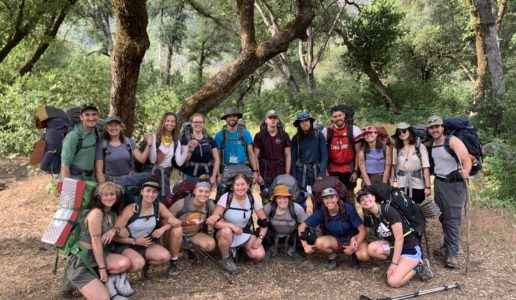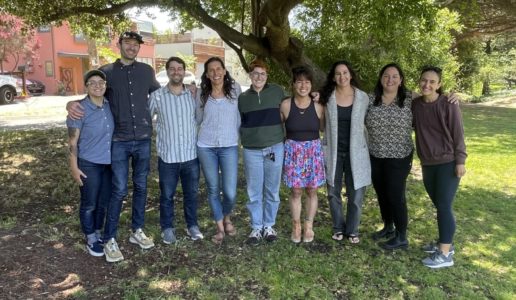Seven Reasons Studying Torah Fuels the Mind
By: Meg Adler, Tawonga Bar & Bat Mitzvah Program Manager
I used to just love Torah study; it’s fun, creative and helps me think in complex ways. But now I not only love studying Torah, I think it can strengthen the mind and even salvage humanity.
In the Tawonga Bar & Bat Mitzvah program, we strive to study Torah with audacious creativity while still honoring traditional methods and practices. For example, we teach our students to approach any text using the Pardes method – analyzing multiple layers of meaning within – but only after they have dramatically acted out the story on their own.
More than anything, we want our students to learn HOW to think, not WHAT to think. Doing this is living a Torah way of life, and raising thoughtful, creative and independent thinkers who aren’t afraid of honest, respectful dialogue – something our world desperately needs.
So without further ado, here are my seven reasons why Torah study strengthens the brain and mind.
1.Holding Multiple Interpretations
Studying Torah is an art. When we sit down to read the stories or laws, we can interpret them in so many different ways. Maybe the story of Eve eating the forbidden fruit in the Garden of Eden is about her disobedience to Adam, but maybe it’s about her audacity and desire to make her own choices. Neither idea is right or wrong and Torah study is not about winning a debate. Instead, it means holding our ideas in tandem with other interpretations, even if they are in direct conflict.
2. Beginner’s Mind
Every year the Jewish people read through the entire Torah, week by week. Come fall, it’s time to finish up the last chapter and start all over again at the beginning (and we have been doing this for centuries). When we study this way, we practice what the Zen Buddhist tradition calls “beginner’s mind.” The text is not new, but we approach the text as if we are first-time students, eager to unpack the wisdom hidden within. This orientation humbles and challenges us to set aside what we think we know, and sit up in our chairs, eager to learn more and sharpen our skills.
3. Creative Problem Solving
Sometimes the Torah doesn’t make any sense. Like, how is it possible that Moses wrote the Torah if it continues after he dies (spoiler alert)? The rabbinic practice of Midrash deals with this by smoothing over the pot-holed Torah with creative stories that explain the text’s problems. It’s like Torah fan-fiction! For example, one might ask, why did G*d choose Abraham to be the father of G*d’s people? Well, the writers of Midrash wrote stories from Abraham’s youth (including the one where he smashes the idols) to explain why he was such an exceptional human. Torah study begs us to flex our creative problem solving skills.
4. Connection to World Community and Ancestry
When we read the Torah portion every Shabbat, we connect to Jews all over the world who are reading the exact same words. In a way, this may seem restrictive – what if you would rather read another section of Torah? While you might not love every portion, when we read Torah on the proscribed schedule, we connect to Jews everywhere. Better yet, when we tap into this rhythm and calendar, we synchronize with our ancestors and live in their wisdom.
5. Meaning in the Mundane
Yes, some Torah portions are boring. Or rather, some have less narrative and more lists and lists and laws and lists. But alas, the more boring the text, the more challenged we are to find its nuggets of meaning. Today, with instagram and candy crush, it’s possible to never be bored ever again! This concerns me because boredom is the most fertile ground for new insight. While the boredom of not knowing what to do and the boredom of a Torah genealogy may not be the same, the principle still applies; allowing for boredom means allowing for creative growth.
6. Confronting the Horrible
Sometimes, Torah is dangerous. Portions of the Torah can seem to condemn LGBTQ folks and affirm slavery. Some people would have us skip it or rip it out, but I do not look to Torah for unequivocal righteousness. Instead, in Torah I find a harsh but honest reflection of our world. While the content of Torah is not our moral compass, studying Torah forces us to confront the ills of our world and demands that after we close our books, we work to heal all life on Earth.
7. Not a Solo Sport
Finally, studying Torah is ideally done in small groups of two to five called chevruta. When we study with others, we learn how to work on a team towards a common goal of understanding the text. We practice disagreeing respectfully and try out new techniques of proposing and defending our ideas. Studying in chevruta puts you in the driver seat of your own learning, with co-pilots to help you on your way.
In the Tawonga Bar & Bat Mitzvah program, we teach Torah as a way of being in the world. Yes, we’d like our students to know who Moses and Miriam are. And yes, the Torah has some good lessons. But most importantly, Torah study teaches us HOW to think and engage in the world. That is our Jewish legacy.
Learn more about Camp Tawonga’s Bay Area-based Bar & Bat Mitzvah Program here. To register for our fall 2019 cohort, start the process here.
 Meg joined Tawonga’s Bar & Bat Mitzvah team in 2018 after receiving a Masters of Religion from Yale Divinity School and a certificate in JewishEducation for Adolescents and Emerging Adults through Hebrew Union College – Jewish Institute of Religion. She is also a Tawonga camper and staff alum. When not studying Torah or trying to create the best Jewish educational experiences, Meg loves to ride her bike, cook for her friends and family, and draw building portraits. Read more of Meg’s writing here and here.
Meg joined Tawonga’s Bar & Bat Mitzvah team in 2018 after receiving a Masters of Religion from Yale Divinity School and a certificate in JewishEducation for Adolescents and Emerging Adults through Hebrew Union College – Jewish Institute of Religion. She is also a Tawonga camper and staff alum. When not studying Torah or trying to create the best Jewish educational experiences, Meg loves to ride her bike, cook for her friends and family, and draw building portraits. Read more of Meg’s writing here and here.
Meg works alongside Deborah Newbrun, Tawonga’s Senior Jewish Educator, and Ashley Costello, Tawonga’s Director of Community Outreach, to make up the fantastic Bar & Bat Mitzvah Program team. Read more about them.

